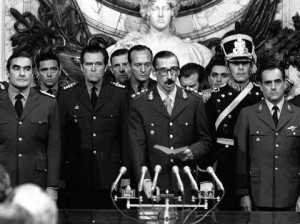
Gen. Jorge Rafael Videla took power in Argentina in a 1976 coup and led a military junta that killed thousands of his fellow citizens in a dirty war to eliminate “subversives.” AP Photo/Eduardo Di Baia, File
WASHINGTON — President Obama is moving to declassify American military, intelligence and law enforcement records that could reveal what the United States government knew about Argentina’s brutal “dirty war” of the 1970s and ’80s, a senior adviser said on Thursday, hoping to pierce the shroud of secrecy that has surrounded a painful chapter in that country’s history.
Susan E. Rice, Mr. Obama’s national security adviser, said that the president would use a visit to Argentina on Wednesday and Thursday, which coincides with the 40th anniversary of the 1976 coup that began the war, to honor the victims and formally begin the declassification process.
“On this anniversary and beyond, we’re determined to do our part as Argentina continues to heal and move forward as one nation,” Ms. Rice said during a speech at the Atlantic Council in Washington.
Human rights activists have long pressed for access to more classified United States records about the war, which lasted from 1976 to 1983, a period when the Argentine government and military carried out vicious crackdowns against dissidents and abducted thousands of people, including babies taken from parents who were detained.
The Argentine government had formally requested that the documents be declassified. The issue has taken on greater urgency in recent days, after human rights groups noted that Mr. Obama would be in Argentina on the painful anniversary and began pressing him to use the occasion to acknowledge the abuses that took place.
Several of the groups, including Abuelas de la Plaza de Mayo — which works to find people who were taken as babies during the dictatorship and raised by families close to the military — submitted a formal request on Monday to the United States Embassy in Buenos Aires for Mr. Obama to release the secret records.
Peter Kornbluh, a senior analyst at the National Security Archive, a group that opposes government secrecy, said Mr. Obama should be applauded for engaging in “declassified diplomacy.”
The president’s decision, Mr. Kornbluh said, “not only provides a historical atonement for early U.S. support for the coup and the repression in its aftermath, but also can provide actual evidence and answers to the families of human rights victims who continue to search for their missing loved ones in Argentina, 40 years after the coup took place.”
